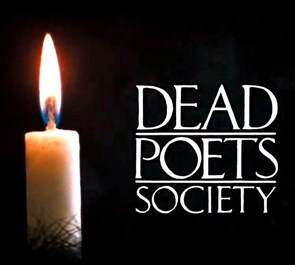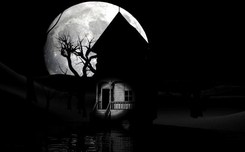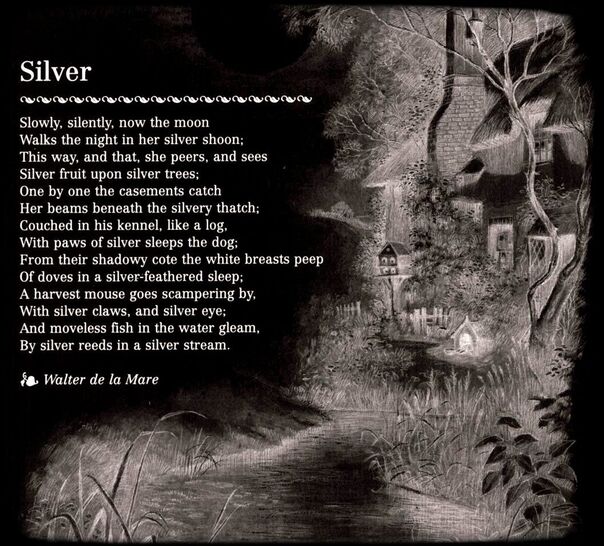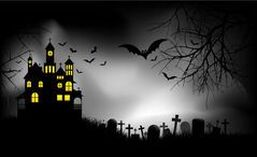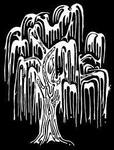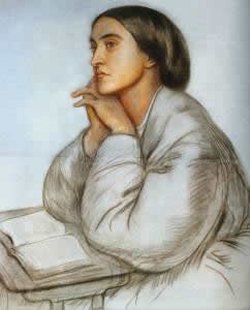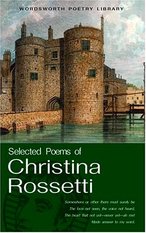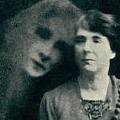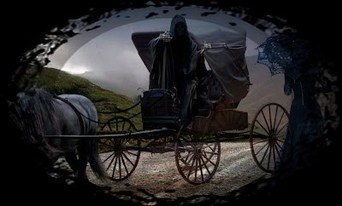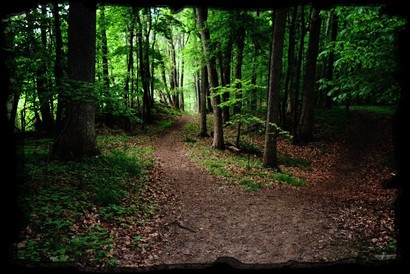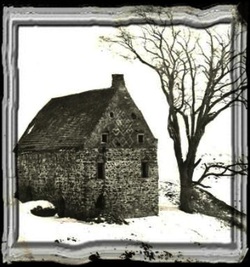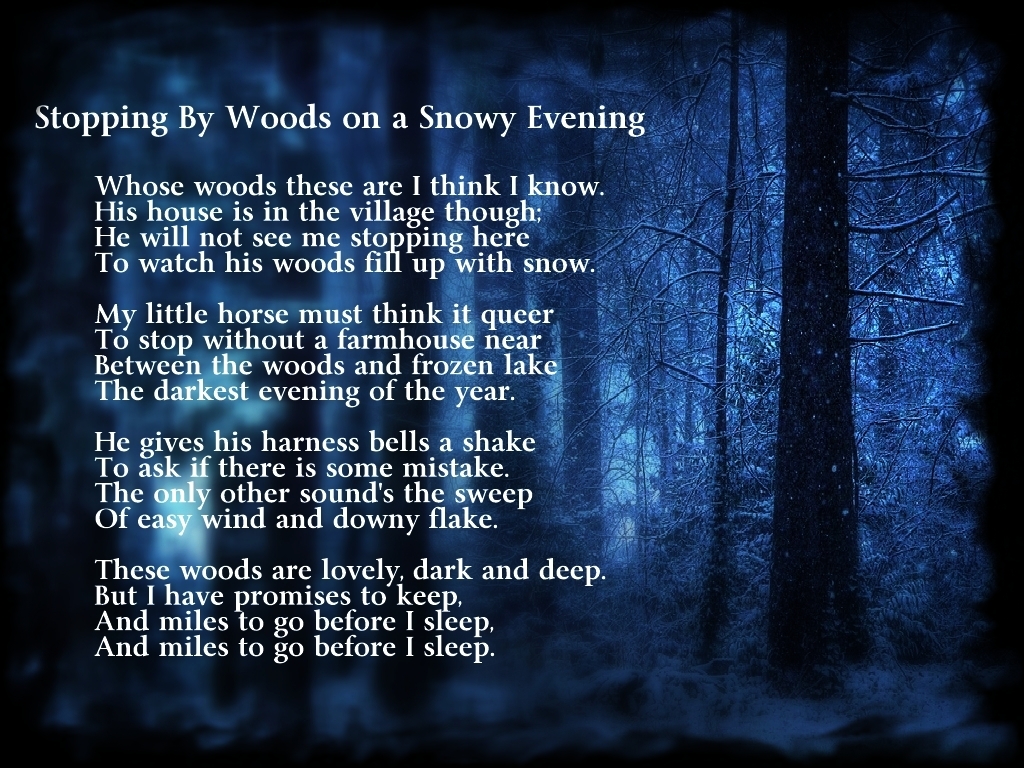GOTHIC POETRY
"The Graveyard School"

Do not stand at my grave and weep,
I am not there; I do not sleep.
I am a thousand winds that blow,
I am the diamond glints on snow,
I am the sun on ripened grain,
I am the gentle autumn rain.
When you awake to morning’s hush,
I am the swift uplifting rush
Of quiet birds in circling flight.
I am the soft starlight at night.
Do not stand at my grave and cry,
I am not there... I did not die.
I am not there; I do not sleep.
I am a thousand winds that blow,
I am the diamond glints on snow,
I am the sun on ripened grain,
I am the gentle autumn rain.
When you awake to morning’s hush,
I am the swift uplifting rush
Of quiet birds in circling flight.
I am the soft starlight at night.
Do not stand at my grave and cry,
I am not there... I did not die.
_______________________________________________________________________________________________
WALTER DE LA MARE
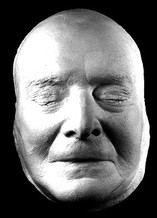
...was born on April the 25th, 1873 in Charlton, Kent, England. He died on June 22nd, 1956. He is probably best remembered for his works for children and for his poem, "The Listeners". He also wrote some subtle psychological horror stories, amongst them "Seaton's Aunt" and "Out of the Deep."
De la Mare described two distinct "types" of imagination, although "aspects" might be a better term: the child-like and the boy-like. It was at the border between the two that Shakespeare, Dante, and the rest of the great poets lay.
De la Mare claimed that all children fall into the category of having a super-creative imagination at first, which is normally replaced at some point in their lives with more mundane things.
http://www.walterdelamare.co.uk/
http://www.public-domain-poetry.com/
walter-de-la-marehttp://www.poemhunter.com/walter-de-la-mare/poems/
http://www.mickputtock.com/walter-de-la-mare
De la Mare described two distinct "types" of imagination, although "aspects" might be a better term: the child-like and the boy-like. It was at the border between the two that Shakespeare, Dante, and the rest of the great poets lay.
De la Mare claimed that all children fall into the category of having a super-creative imagination at first, which is normally replaced at some point in their lives with more mundane things.
http://www.walterdelamare.co.uk/
http://www.public-domain-poetry.com/
walter-de-la-marehttp://www.poemhunter.com/walter-de-la-mare/poems/
http://www.mickputtock.com/walter-de-la-mare
|
|
|
| ||||||||||||||||||||||||
"The Listeners"
"Is there anybody there?" said the Traveller, Knocking on the moonlit door;
And his horse in the silence champed the grass, Of the forest's ferny floor;
And out flew a bird from the turret, High above the Traveller's head,
And he smote upon the door a second time,
"Is there anybody there?" he said.
But no one descended to the Traveller; No head from the leaf-fringed sill
Leaned over and looked into his grey eyes, Where he stood perplexed and still.
But only a host of phantom listeners That dwelt in the lone house then,
Stood listening in the quiet of the moonlight, To that voice from the world of men;
Stood thronging in moonbeams faint and pale, down the stair to the empty hall,
In an air stirred hearkening and shaken
By the lonely Traveller's call.
And he felt in his heart their strangeness, Their stillness answering his cry,
While his horse moved cropping the dank'ish turf, 'Neath the starred and leafy sky;
For he suddenly smote on the door, even Louder, then turned and lifted his head:
"Tell them I came!" and no one answered, "That I kept my word!" he said.
Never a stir made the listeners, Though every word he spake
Fell echoing through the house, in empty stillness, From the one man left awake;
Ay, they heard his foot upon the stirrup, And the sound of iron on stone,
And how the silence surged softly backward,
When the plunging hoofs were gone.
And his horse in the silence champed the grass, Of the forest's ferny floor;
And out flew a bird from the turret, High above the Traveller's head,
And he smote upon the door a second time,
"Is there anybody there?" he said.
But no one descended to the Traveller; No head from the leaf-fringed sill
Leaned over and looked into his grey eyes, Where he stood perplexed and still.
But only a host of phantom listeners That dwelt in the lone house then,
Stood listening in the quiet of the moonlight, To that voice from the world of men;
Stood thronging in moonbeams faint and pale, down the stair to the empty hall,
In an air stirred hearkening and shaken
By the lonely Traveller's call.
And he felt in his heart their strangeness, Their stillness answering his cry,
While his horse moved cropping the dank'ish turf, 'Neath the starred and leafy sky;
For he suddenly smote on the door, even Louder, then turned and lifted his head:
"Tell them I came!" and no one answered, "That I kept my word!" he said.
Never a stir made the listeners, Though every word he spake
Fell echoing through the house, in empty stillness, From the one man left awake;
Ay, they heard his foot upon the stirrup, And the sound of iron on stone,
And how the silence surged softly backward,
When the plunging hoofs were gone.
"Song of Enchantment"
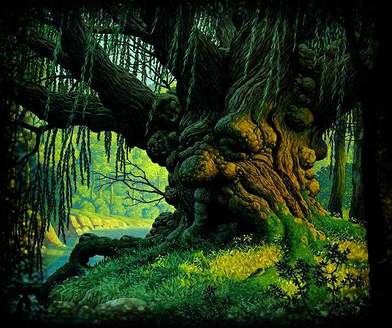
A Song of Enchantment I sang me there,
In a green - green wood, by waters fair,
Just as the words came up to me
I sang it under a wildwood tree.
Widdershins turned I, singing it low,
Watching the wild birds come and go;
No cloud in the deep dark blue to be seen
Under the thick-thatched branches green.
Twilight came; silence came;
The planet of Evening's silver flame;
By darkening paths I wandered through
Thickets trembling with star-lit dew.
But the music is lost and the words are gone
Of that song I sang as I sat anon,
Ages and ages have fallen on me---
On the wood and the pool and the wildwood tree.
In a green - green wood, by waters fair,
Just as the words came up to me
I sang it under a wildwood tree.
Widdershins turned I, singing it low,
Watching the wild birds come and go;
No cloud in the deep dark blue to be seen
Under the thick-thatched branches green.
Twilight came; silence came;
The planet of Evening's silver flame;
By darkening paths I wandered through
Thickets trembling with star-lit dew.
But the music is lost and the words are gone
Of that song I sang as I sat anon,
Ages and ages have fallen on me---
On the wood and the pool and the wildwood tree.
|
|
|
|
|
"Haunted" From out the wood I watched them shine, The windows of the haunted house, Now ruddy as enchanted wine, Now dark as flittermouse. There went a thin voice piping airs Along the grey and crooked walks, A garden of thistledown and tares, Bright leaves, and giant stalks. The twilight rain shone at its gates, Where long-leaved grass in shadow grew; And black in silence to her mates A voiceless raven flew. |
Lichen and moss the lone stones greened,
Green paths led lightly to its door, Keen from her hair the spider leaned, And dusk to darkness wore. Amidst the sedge a whisper ran, The West shut down a heavy eye, And like last tapers, few and wan, The watch-stars kindled in the sky. |
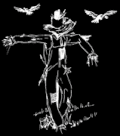
"The Scarecrow"
All winter through I bow my head
beneath the driving rain;
the North Wind powders me with snow
and blows me black again;
All winter through I bow my head
beneath the driving rain;
the North Wind powders me with snow
and blows me black again;
|
at midnight 'neath a maze of stars
I flame with glittering rime, and stand above the stubble, stiff as mail at morning-prime. But when that child called Spring, and all his host of children come, scattering their buds and dew upon these acres of my home, some rapture in my rags awakes; I lift void eyes and scan the sky for crows, those ravening foes, of my strange master, Man. |
I watch him striding lank behind
his clashing team, and know soon will the wheat swish body high where once lay a sterile snow; soon I shall gaze across a sea of sun-begotten grain, which my unflinching watch hath sealed for harvest once again. |
"The Raven's Tomb"
"Voices"
"The Old Stone House"
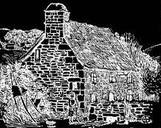
Nothing on the grey roof, nothing on the brown,
Only a little greening where the rain drips down;
Nobody at the window, nobody at the door,
Only a little hollow which a foot once wore;
But still I tread on tiptoe, still tiptoe on I go,
Past nettles, porch, and weedy well, for oh... oh I know:
A friendless face is peering, and a still clear eye
Peeps closely through the casement
as my step goes by.
Only a little greening where the rain drips down;
Nobody at the window, nobody at the door,
Only a little hollow which a foot once wore;
But still I tread on tiptoe, still tiptoe on I go,
Past nettles, porch, and weedy well, for oh... oh I know:
A friendless face is peering, and a still clear eye
Peeps closely through the casement
as my step goes by.
"The Stranger"
|
|
|
|
| ||||||||||||||||||||||||||||||||||||||||||
_______________________________________________________________________________________________
| |||||||
When I am dead, my dearest, Sing no sad songs for me;
Plant thou no roses at my head, Nor shady cypress tree.
Alone green grass above me, With showers and dew-drop wet;
And if thou wilt, remember... And if thou wilt, forget.
For I'll not see the shadows, I shall not feel the rain;
I shall not hear the nightingale Sing on, as if in pain.
And dreaming through the twilight, That doth not rise nor set---
Haply I may remember... Or Haply may forget.
"A Chilly Night"
_______________________________________________________________________________________________
EMILY DICKINSON
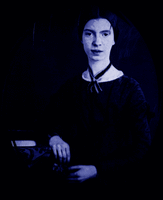
1830-1886, was an iconic American poet. Born in Amherst, Massachusetts, to a successful family with strong community ties, she lived a mostly introverted and reclusive life. Thought of as an eccentric by the locals, she became known for her penchant for white clothing and her reluctance to greet guests or, later in life, even leave her room. Most of her friendships were therefore carried out by correspondence. Many of her poems deal with themes of death and immortality, two recurring topics in letters to her friends.
It has been said, that Emily Dickinson was a 'Mystic Colossus' who lived her external life among mental and spiritual Lilliputians.
http://www.online-literature.com/dickinson/
http://www.public-domain-poetry.com/emily-elizabeth-dickinson
It has been said, that Emily Dickinson was a 'Mystic Colossus' who lived her external life among mental and spiritual Lilliputians.
http://www.online-literature.com/dickinson/
http://www.public-domain-poetry.com/emily-elizabeth-dickinson
Because I could not stop for Death,
He kindly stopped for me;
The Carriage held but just Ourselves
And Immortality.
We slowly drove, He knew no haste,
And I had put away
My labor, and my leisure too,
For His Civility.
We passed a School, where Children strove
At Recess, in the Ring;
We passed the Fields of Gazing Grain,
We passed the Setting Sun.
Then paused before a House that seemed
A Swelling of the Ground;
The Roof was scarcely visible,
The Cornice in the Mound.
Since then 'tis centuries, and yet
Feels shorter than the Day
I first surmised the Horses' Heads
Were toward eternity.
He kindly stopped for me;
The Carriage held but just Ourselves
And Immortality.
We slowly drove, He knew no haste,
And I had put away
My labor, and my leisure too,
For His Civility.
We passed a School, where Children strove
At Recess, in the Ring;
We passed the Fields of Gazing Grain,
We passed the Setting Sun.
Then paused before a House that seemed
A Swelling of the Ground;
The Roof was scarcely visible,
The Cornice in the Mound.
Since then 'tis centuries, and yet
Feels shorter than the Day
I first surmised the Horses' Heads
Were toward eternity.
_______________________________________________________________________________________________________________________________________________________________
|
|
|
|
| ||||||
_______________________________________________________________________________________________________________________________________________________________
This quiet dust was gentlemen and ladies
And lads and girls;
Was laughter and ability and sighing,
And frocks and curls;
This passive place a summer's nimble mansion,
Where bloom and bees
Fulfilled their oriental circuit,
Then ceased like these.
And lads and girls;
Was laughter and ability and sighing,
And frocks and curls;
This passive place a summer's nimble mansion,
Where bloom and bees
Fulfilled their oriental circuit,
Then ceased like these.
_______________________________________________________________________________________________
ROBERT FROST
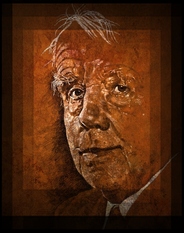
Born on March 26, 1874, died 1963, Robert Frost spent his first 40 years as an unknown. He exploded on the scene after returning from England at the beginning of WWI. Winner of four Pulitzer Prizes and a special guest at President John F. Kennedy’s inauguration, Frost became a poetic force and the unofficial "poet laureate" of the United States.
His work frequently employed settings from rural life in New England in the early twentieth century, using them to examine complex social and philosophical themes. A self-acclaimed "Rural Mystic" by nature, Frost frequently presented pessimistic, dark and even menacing undertones in his poetry, elements which often are neither recognized nor analyzed.
http://www.poets.org/poet.php/prmPID/192
http://www.online-literature.com/frost/
"The Road Not Taken"
Two roads diverged in a yellow wood,
And sorry I could not travel both And be one traveler, long I stood
And looked down one as far as I could To where it bent in the undergrowth;
Then took the other, as just as fair,
And having perhaps the better claim Because it was grassy and wanted wear,
Though as for that, the passing there Had worn them really about the same;
And both that morning equally lay In leaves no step had trodden black.
Oh, I marked the first for another day!
Yet knowing how way leads on to way, I doubted if I should ever come back.
I shall be telling this with a sigh, Somewhere ages and ages hence:
Two roads diverged in a wood, and I--- I took the one less traveled by,
And that has made all the difference.
"Ghost House"
I dwell in a lonely house I know That vanished many a summer ago,
And left no trace but the cellar walls, And a cellar in which the daylight falls,
And the purple-stemmed wild raspberries grow.
O'er ruined fences the grape-vines shield, The woods come back to the mowing field;
The orchard tree has grown one copse Of new wood and old, where the woodpecker chops;
The footpath down to the well is healed.
I dwell with a strangely aching heart,
In that vanished abode there far apart, On that disused and forgotten road
That has no dust-bath for the lowly toad.
It is under the small, dim, summer star,
I know not who these mute folk are Who share the unlit place with me---
Those stones out under the low-limbed tree, Doubtless bear names that the mosses mar.
They are tireless folk, but slow and sad, Though two, close-keeping, are lass and lad,---
With none among them that ever sings, And yet, in view of how many things,
As sweet companions as might be had.
|
|
|
|
| robert_frost_poems.pdf | |
| File Size: | 639 kb |
| File Type: | |
_______________________________________________________________________________________________
MISC.
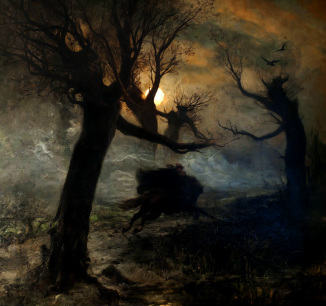
"The Erl-King" (Goethe)
Who's riding so late through th' endless wild?
The father 'tis with his infant child;
He thinks the boy's well off in his arm,
He grasps him tightly, he keeps him warm.
My son, say why are you hiding your face?
Oh father, the Erlking's coming apace,
The Erlking s here with his train and crown!
My son, the fog moves up and down---
"Be good, my child, come, go with me!
I know nice games, will play them with thee,
And flowers thou'I find near by where I live,
pretty dress my mother will give."
Dear father, oh father, and do you not hear,
What th' Erlking whispers so close to my ear?
Be quiet, do be quiet, my son,
Through leaves the wind is rustling anon.
Do come, my darling, oh come with me!
Good care my daughters will take of thee,
My daughters will dance about in a ring,
Will rock thee to sleep and will prettily sing."
Dear father, oh father, and do you not see
The Erlking's daughters so near to me?
My son, my son, no one's in our way,
The willows are looking unusually gray.
I love thee, thy beauty I covet and choose,
Be willing, my darling, or force I shall use!
"Dear father, oh father, he seizes my arm!
The Erlking, father, has done me harm."
The father shudders, he darts through the wild;
With agony fill him the groans of his child.
He reached his farm with fear and dread;
The infant son in his arms was dead.
Who's riding so late through th' endless wild?
The father 'tis with his infant child;
He thinks the boy's well off in his arm,
He grasps him tightly, he keeps him warm.
My son, say why are you hiding your face?
Oh father, the Erlking's coming apace,
The Erlking s here with his train and crown!
My son, the fog moves up and down---
"Be good, my child, come, go with me!
I know nice games, will play them with thee,
And flowers thou'I find near by where I live,
pretty dress my mother will give."
Dear father, oh father, and do you not hear,
What th' Erlking whispers so close to my ear?
Be quiet, do be quiet, my son,
Through leaves the wind is rustling anon.
Do come, my darling, oh come with me!
Good care my daughters will take of thee,
My daughters will dance about in a ring,
Will rock thee to sleep and will prettily sing."
Dear father, oh father, and do you not see
The Erlking's daughters so near to me?
My son, my son, no one's in our way,
The willows are looking unusually gray.
I love thee, thy beauty I covet and choose,
Be willing, my darling, or force I shall use!
"Dear father, oh father, he seizes my arm!
The Erlking, father, has done me harm."
The father shudders, he darts through the wild;
With agony fill him the groans of his child.
He reached his farm with fear and dread;
The infant son in his arms was dead.
ADDENDUM & LINKS
| classic_death_poems.pdf | |
| File Size: | 308 kb |
| File Type: | |
http://www.litgothic.com/Topics/graveyard_school.html
http://www.gothicgays.de/1/
http://www.deadlounge.com/poetry/poems.html
http://www.britannica.com/EBchecked/media/138928/Dr
http://www.public-domain-poetry.com/
http://www.gothicgays.de/1/
http://www.deadlounge.com/poetry/poems.html
http://www.britannica.com/EBchecked/media/138928/Dr
http://www.public-domain-poetry.com/
_______________________________________________________________________________________________
Your browser does not support viewing this document. Click here to download the document.
Your browser does not support viewing this document. Click here to download the document.
